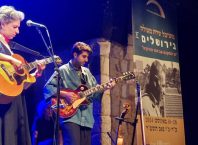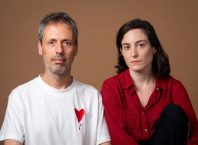HEMDA is a centre for science education in Tel Aviv, a place which is the science campus for 18 high schools in Tel Aviv. Pupils who study chemistry, physics and computational science arrive to attend their lessons there (and so did I, a few years ago!). After school hours, the center invites the community to learn some more science just for fun. This is done as part of the “culture science” program held at HEMDA, organized by Dr. Eitan Krein.
So it was as part of that program that I had the chance to hear a lecture about happiness from a physics professor, Yoram Kirsch. The title alone is a live example of science and diversity. The place was packed, and it was clear that there is a crowd for such events, and that the people of Tel Aviv are thirsty for some “intellectual” fun.
Prof. Kirsch began with a historical view of “the science of happiness”. He told us how happiness was explored from many angles through out the last centuries. Philosophers, poets and writers were all engaged with the concept of happiness. However, psychology and sociology were only interested in the field once the paradox of American suburbia was revealed. Until that point, everybody intuitively presumed that those that are in “good shape” (young, healthy and financially established) are happy. But with the American suburbanization, it turned out that people, who earned a fairly good living, were suddenly showing higher rates of alcoholism, divorces and were seeking professional counseling. From that point the “science of happiness” began.
Another interesting point in the talk, once we learned that there happiness is “scientific”, was the measurement of happiness. So, Prof. Kirsch asked, how can one quantify something which is rather subjective? We can all reflect on days that have passed and wonder whether we were truly happy then. The more nostalgic of us will recall “the good old days”. But, in retrospect, is such contemplation scientific? Aren’t we all inclined, wishfully thinking about the past as sweeter than in it actually was, to answer about our happiness as we would like it to be and not as it actually is? So the measurement method is an inherent part of the field of happiness.
However, no matter how happiness is measured, it turned out that Israelis are pretty happy. In data from the Israeli central bureau of statistics, 84 % of Israelis are generally satisfied with life. People who hold a job are happier with their life than those that are unemployed, married people in Israel are a little happier then singles and much happier than divorcees and widows/ers. Education also helps people in Israel be happier; regardless of the effect education has on the income. One possible explanation for this effect of education on happiness is that people who purchased higher education feel that they successfully achieved their goals. So a total of the people in Israel are happy, and this is consistent with other countries worldwide.
If you wish to achieve or improve your own happiness, there isn’t much “scientific” agreement about what should you do. But there are a few ground rules that were suggested in the lecture. To start with, it is always better to be amongst others. Apparently, not only getting married (and maintaining a good marriage) helps, but also having kids and friends. Also – keep yourself busy, since apparently busy people are happier. You might want to do this through some volunteer work and social involvement – a way of being busy, having social connections and helping others – a wonderful recipe for catching three birds from the “happiness tree” at once. In conclusion, another way to raise your own levels of happiness (or lower levels of frustration) is to accept life’s little difficulties and frustrations without too much rumination – even if the difficulty is the non conclusive conclusion about how to be happy.
Details about future events (in Hebrew) as part of HEMDA scientific culture program could be found on their website.
Yoram Kirsch is a Professor at the Open University of Israel, Department of Natural Science.
The next lecture in the series will take place tonight, Monday February 8, at 19:00.
Professor Yoel Rak will give a talk on evolution: “Half-Man, Half-Ape.” The lecture will be in Hebrew and take place at Hemda, 7 HaPardes Street, Tel Aviv. Entrance is free, but registration is required. Call 03-5210802.
On February 22, Professor Amos Hadas will give a talk on “The Development of Wine-making in the ancient world.”
Image credit: http://www.flickr.com/photos/dotbenjamin/2765083201/
SHANI WAIDERGOREN





